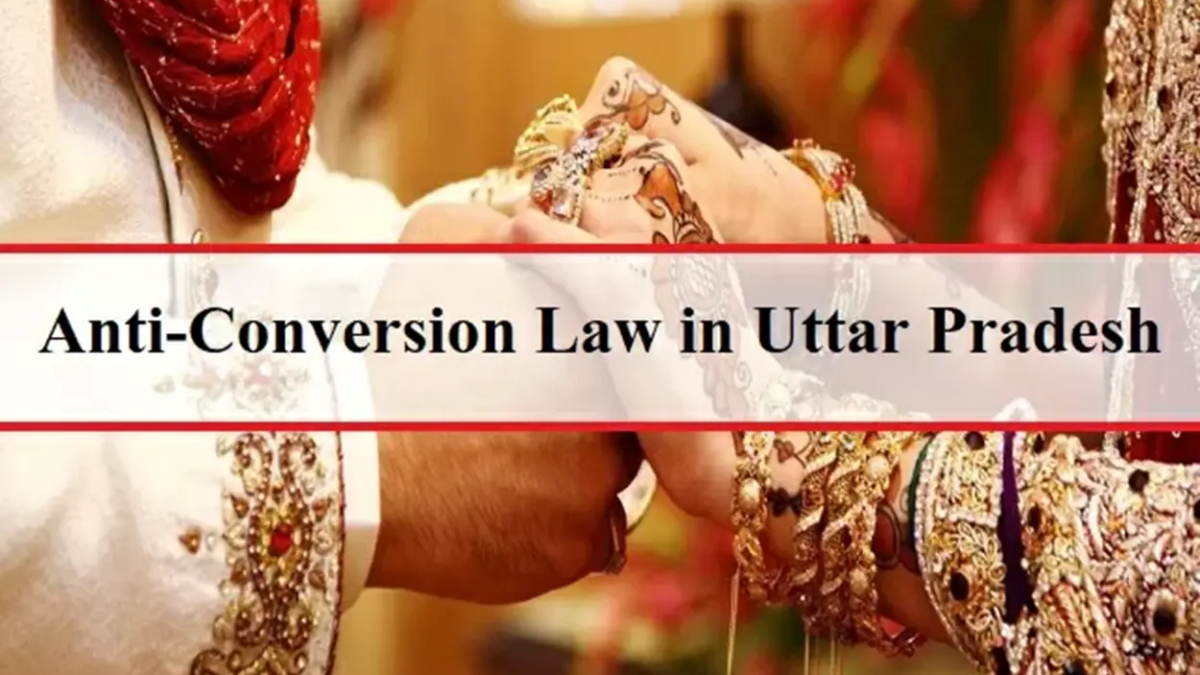- Recently, Uttar Pradesh Assembly passed the UP Prohibition of Unlawful Conversion of Religion (Amendment) Bill, 2024 altering the original 2021 anti-conversion law, making it more stringent and widely enforceable.
- The bill was tabled in the assembly by Parliamentary Affairs Minsiter Suresh Khanna on behalf of CM Yogi Adityanath.
- The step was taken in the light of seriousness of rampant unlawful conversions occurring throughout Uttar Pradesh particularly targeting Scheduled Castes, Scheduled Tribes communities including minors, people with disabilities and economically disadvantaged individuals.
- Purpose of the Act is to regulate religious conversions and prohibit conversions realised by misrepresentation, force, undue influence, coercion, allurement or any fraudulent means.
- It aims to combat love jihad, a concept promoted by Hindutva group claiming that inter-faith marriages are sites of potential forced conversion.
- From 1st January 2021 to 30th April 2023, around 427 cases were registered under the original Act thus emphasizing the seriousness of the offence.
- The Act ensures social harmony and upholds the secular fabric of the nation.
- Article 25 of the Indian Constitution guarantees freedom of religion. It entails the right to freely profess, practice, and propagate religion but not conversions.
- Supreme Court clarified that ”propagation” means to promote a religion, but it does not necessitate converting individuals from one religion to another.
Key features
- Anyone who causes any person to fear of his life or property, assaults or uses force, promises or instigates marriage, conspires or induced any minor, woman or person to traffics or otherwise sells them, will be placed in the most serious category, punishable with a minimum imprisonment of 20 years which may extend to life imprisonment
- Enhanced imprisonment of 3 to 10 years and fine of Rs. 50,000 for base offence
- Term ‘any aggrieved person’ in Section 4 of the present Act have been replaced with ‘any person’ in the amendment bill.
- Imprisonment of 5 to 14 years and fine up to Rs. 1 lakh if the victim is a minor, physically or mentally disabled or belongs from the Schedule Caste or Schedule Tribe
- Imprisonment of 7 to 14 years and fine up to Rs. 1 lakh for mass religious conversions and imprisonment of 7 to 14 years and fine up to Rs. 10 lakh for receiving funds from foreign or illegal institutions for unlawful religious conversions.
- Not only parents, victims or siblings but ‘any person’ can register a First Information Report (FIR) in religious conversion cases
- All crimes under the amended Act are non-bailable unless the public prosecutor opposes bail application and the court is satisfied that there are reasonable grounds to believe that he is not guilty of such offence and that he is not likely to commit any offence while on bail.
- The cases will not be heard by any court below the rank of Sessions Court
- Anyone who wishes to convert of their own volition for the purpose of marriage must submit an application two months in advance to the concerned District Magistrate.
Impact of the Bill
- States such as Uttarakhand, Gujarat, Himachal Pradesh, Jharkhand and Madhya Pradesh have followed the footsteps of Uttar Pradesh and enacted similar anti-conversion laws and introduced similar amendments to strengthen its application and impact.
- It will protect the dignity and social status of women and prevent illegal religious conversions and demographic change.
- The proposed changes will fortify law against such unlawful conversions and enhance its deterrence capability.
Related cases
S Pushpabai v. CT Selvaraj AIR 1971 SC 1180- Supreme Court affirmed that individuals have the right to convert to another religion if the conversion is genuine and voluntary, highlighting that coercion or misrepresentation in religious conversions violates the freedom of religion.
Stanislaus v. State of Madhya Pradesh 1977 SCR (2) 611- Court upheld the laws prohibiting conversion by force, fraud, or allurement and further clarified that “propagate” in Article 25(1) allows one to transmit or spread one’s religion by an exposition of its tenets but not the right to convert another person to one’s own religion.
Sarla Mudgal vs. Union of India AIR 1995 SC 1531- Court stated that conversion to another religion for the purpose of marriage is permissible provided such conversion is genuine and not used to evade legal obligations.
Shafin Jahan v. Ashokan K.M AIR 2018 SC 357- Supreme Court affirmed that adults have the right to marry and convert to another religion of their choice, underlining that the state should not interfere with this freedom.
Conclusion
“The Constitution confers on each individual the fundamental right to profess, practice and propagate his religion. However, the individual right to freedom of conscience and religion cannot be extended to construe a collective right to proselytize.”
This 2024 amendment to anti conversion laws has stirred significant concerns and deliberations. Its stringent provisions and potential risk of abuse raises major scrutiny about its impact on individual freedom of religion and constitutionality. As the law is challenged in the courts its future is unknown but at the same time it holds immense implications for the legal processes and religious freedom in India.


Add a Comment